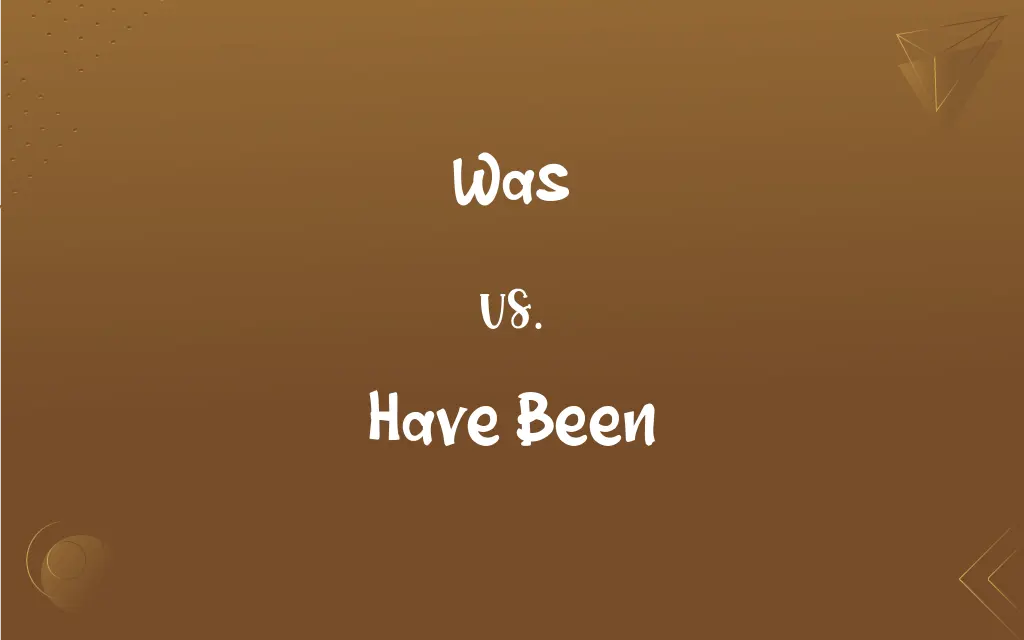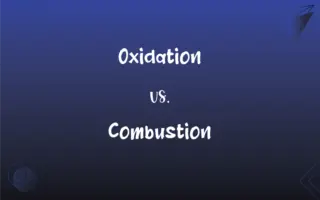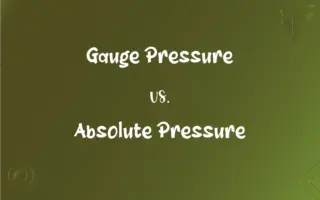Was vs. Have Been: What's the Difference?
Edited by Aimie Carlson || By Janet White || Published on December 11, 2023
Was refers to the past tense of "is," indicating an action or state in the past. Have been refers to the present perfect form of "be," indicating a past action or state with relevance to the present.

Key Differences
Was is used as the past tense form of "is" in English, specifically in the simple past tense. It denotes actions or states that occurred at a specific time in the past and are now completed. In contrast, have been is used in the present perfect tense, combining the past participle "been" with the present tense form "have." This structure indicates an action or state that began in the past and has relevance or effects that extend into the present.
Was is typically used to describe a situation or state that existed at a particular point in the past and no longer exists. For example, "She was a teacher" implies that she is no longer teaching. On the other hand, have been suggests continuity or an unspecified time frame, as in "I have been a teacher," implying that the person started teaching in the past and may still be teaching.
In terms of structure, was is singular and used with subjects like he, she, or it. It provides a clear and definitive description of a past condition or action. Have been, however, is used with plural subjects (we, they) or with "I" or "you," and it often conveys an ongoing or cumulative sense of action or experience.
When expressing duration, was does not inherently imply a specific length of time; it simply states that something occurred in the past. In contrast, have been can imply duration and a connection to the present, as in "I have been working here for five years," suggesting the action started in the past and is still ongoing or has a current relevance.
In narratives, was is used to set scenes or describe states in a concluded time frame. Have been can be used to connect past experiences or actions to the current context of the narrative, offering a bridge between past and present.
ADVERTISEMENT
Comparison Chart
Tense
Simple Past
Present Perfect
Usage
Indicates completed actions or states in the past.
Indicates actions or states from the past continuing to the present.
Time Reference
Specific past time.
Unspecified time frame extending to the present.
Typical Contexts
Historical events, completed actions.
Ongoing experiences, cumulative actions.
Example in a Sentence
"She was in London last year."
"They have been in London since last year."
ADVERTISEMENT
Was and Have Been Definitions
Was
Expresses a past action or state of being.
The movie was interesting.
Have Been
Used to express an action or state that started in the past and may continue.
They have been good friends since childhood.
Was
Used to describe something that existed or occurred in the past.
It was raining yesterday.
Have Been
Shows continuity or cumulative experience from the past to the present.
She has been working on the project for months.
Was
Indicates a condition or situation that no longer exists.
She was in Paris last summer.
Have Been
Conveys a sense of duration and current relevance of past actions or states.
You have been the best player on the team this season.
Was
Past tense of "is," indicating a past state or action.
He was the president of the club last year.
Have Been
Present perfect form of "be," indicating ongoing or past-to-present relevance.
I have been a teacher for ten years.
Was
Used in the past tense narrative to set scenes or events.
The weather was perfect on the day of the event.
Have Been
Indicates experiences or states extending over a period up to now.
We have been to Paris several times.
Was
First and third person singular past indicative of be. See Note at you-uns.
Was
Inflection of be.
I was castigated and scorned.
Was
Inflection of be.
It was a really humongous slice of cake.
Was
Used in phrases with existential there when the semantic subject is (usually third-person) plural.
There was three of them there.
Was
Inflection of be.
Was
Inflection of be
Was
Inflection of be
Was
The first and third persons singular of the verb be, in the indicative mood, preterit (imperfect) tense; as, I was; he was.
FAQs
When is "have been" used?
Use "have been" to describe ongoing actions or states from the past to the present.
When should I use "was"?
Use "was" when referring to a single event or state in the past for singular subjects.
Can "have been" suggest duration?
Yes, especially with time expressions like "for" and "since."
What does "have been" mean?
"Have been" is the present perfect form of "to be," indicating an action that began in the past and continues to the present.
Can "have been" indicate completed actions?
Yes, especially when referring to experiences up to the present.
Is "have been" used in passive constructions?
Yes, it's often used in the present perfect passive form.
What is the basic meaning of "was"?
"Was" is the past tense of the verb "to be," used for singular subjects.
Can "was" be used for plural subjects?
No, use "were" for plural subjects.
Is "have been" singular or plural?
"Have been" is used with plural subjects and "I."
What's a common mistake with "was" and "have been"?
Mixing up singular/plural subjects with "was/were" and using "have been" for completed actions.
Can "was" denote a habitual action in the past?
No, "was" is for specific instances. Use "used to" for habitual past actions.
How do "was" and "have been" differ in time perspective?
"Was" is strictly past, while "have been" links past actions or states to the present.
How does "have been" work in questions?
In questions, it often starts the sentence, e.g., "Have you been...?"
Is "have been" formal or informal?
It's neutral and used in both formal and informal contexts.
In what type of sentences is "was" commonly used?
"Was" is commonly used in simple past tense sentences.
Can "have been" be used with specific time in the past?
No, it's used for unspecified time periods up to the present.
What's the first person singular form of "was"?
"I was" is the first person singular form.
Can "was" be used for future events?
No, "was" is exclusively for past events.
Can "was" be used with "since" or "for"?
No, "was" isn't used with "since" or "for." These are used with perfect tenses.
Does "was" always need a subject?
Yes, "was" always requires a subject.
About Author
Written by
Janet WhiteJanet White has been an esteemed writer and blogger for Difference Wiki. Holding a Master's degree in Science and Medical Journalism from the prestigious Boston University, she has consistently demonstrated her expertise and passion for her field. When she's not immersed in her work, Janet relishes her time exercising, delving into a good book, and cherishing moments with friends and family.
Edited by
Aimie CarlsonAimie Carlson, holding a master's degree in English literature, is a fervent English language enthusiast. She lends her writing talents to Difference Wiki, a prominent website that specializes in comparisons, offering readers insightful analyses that both captivate and inform.































































